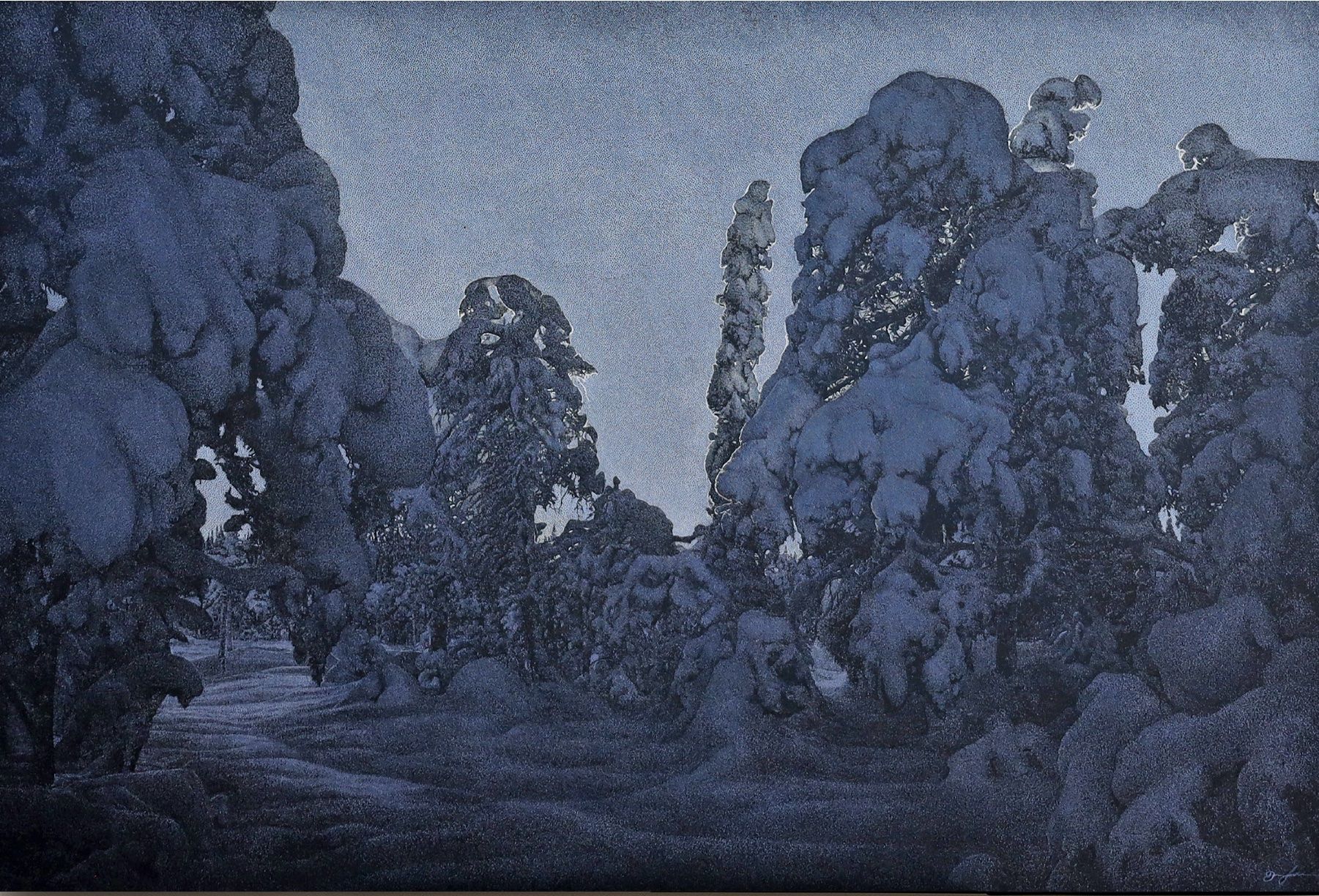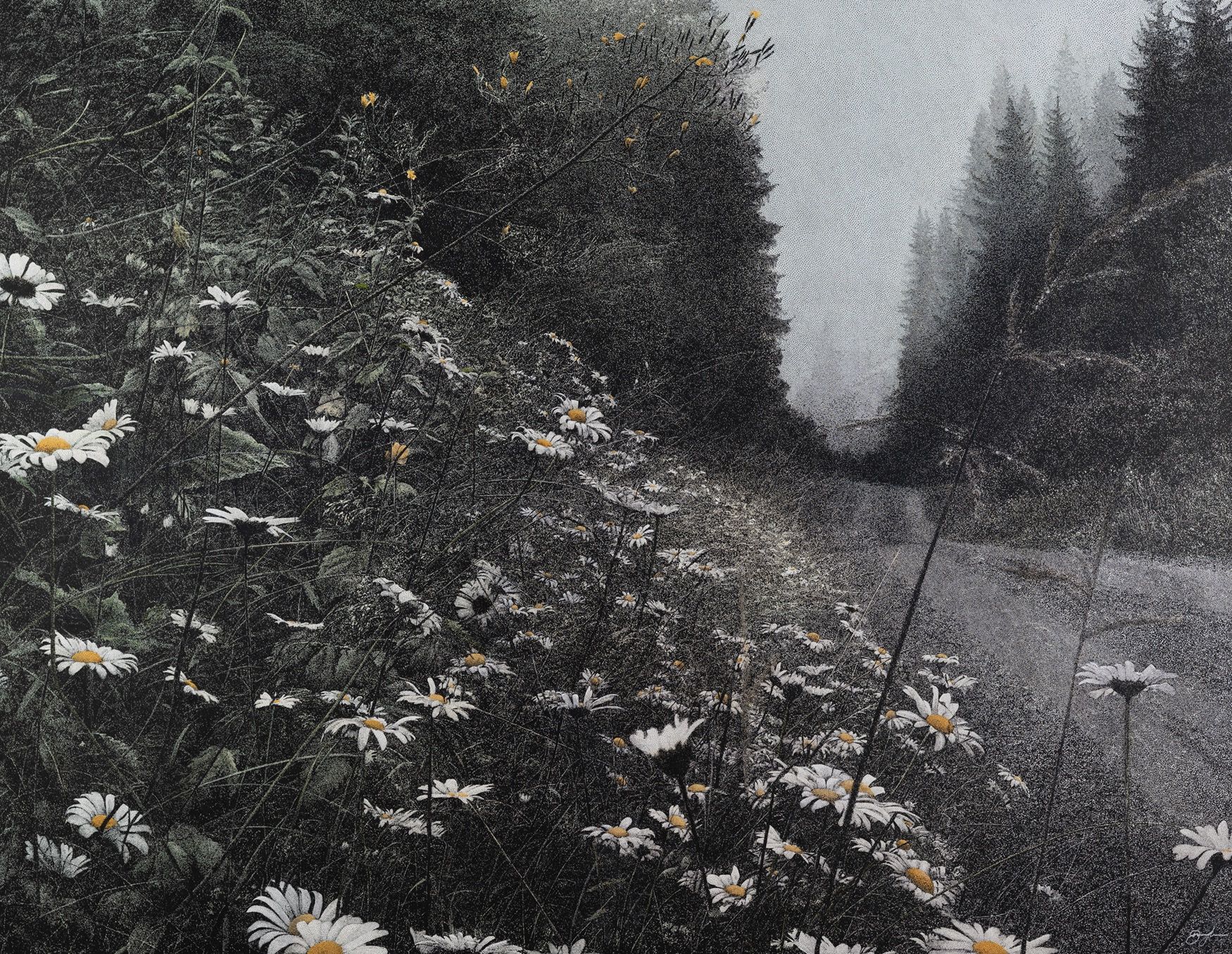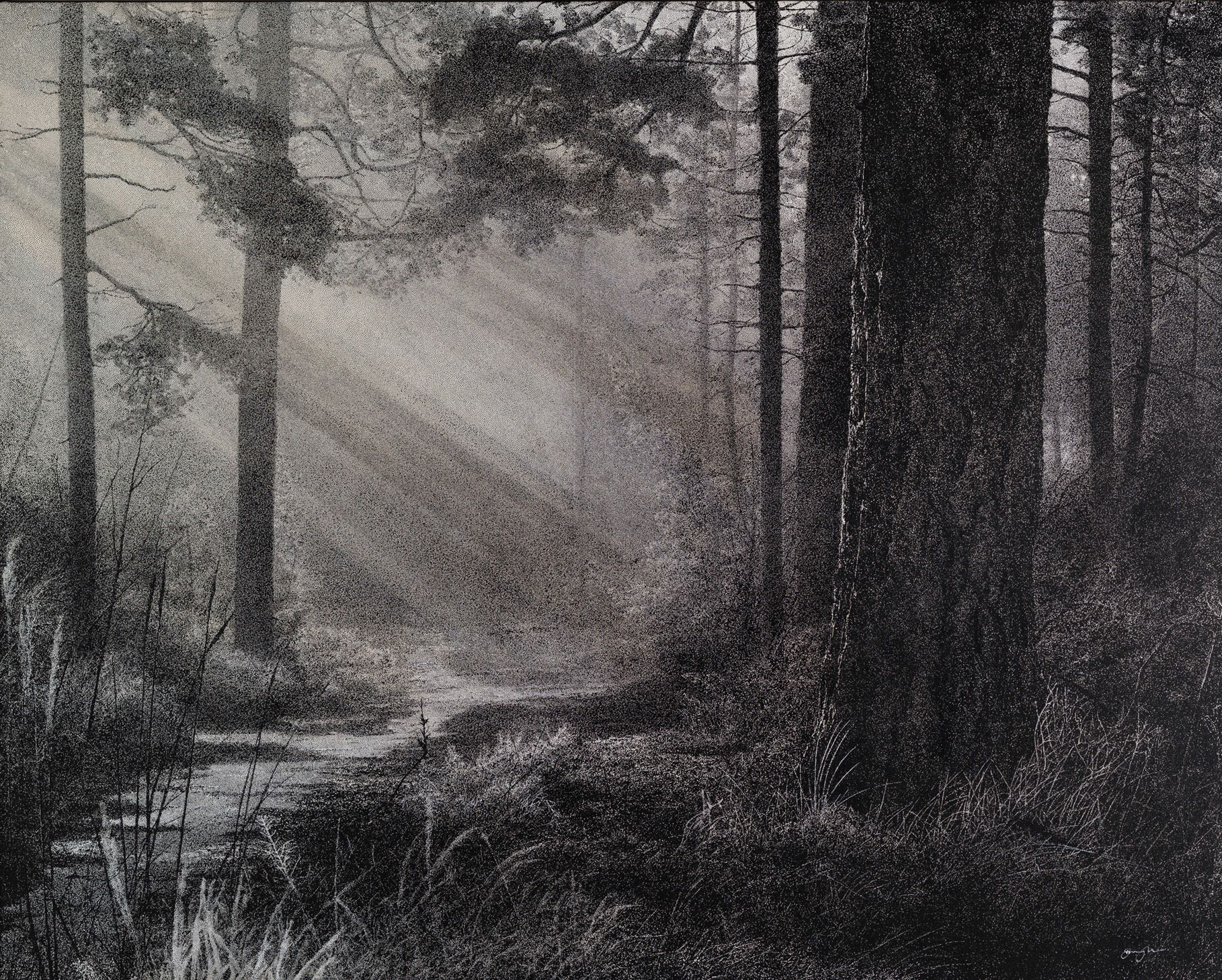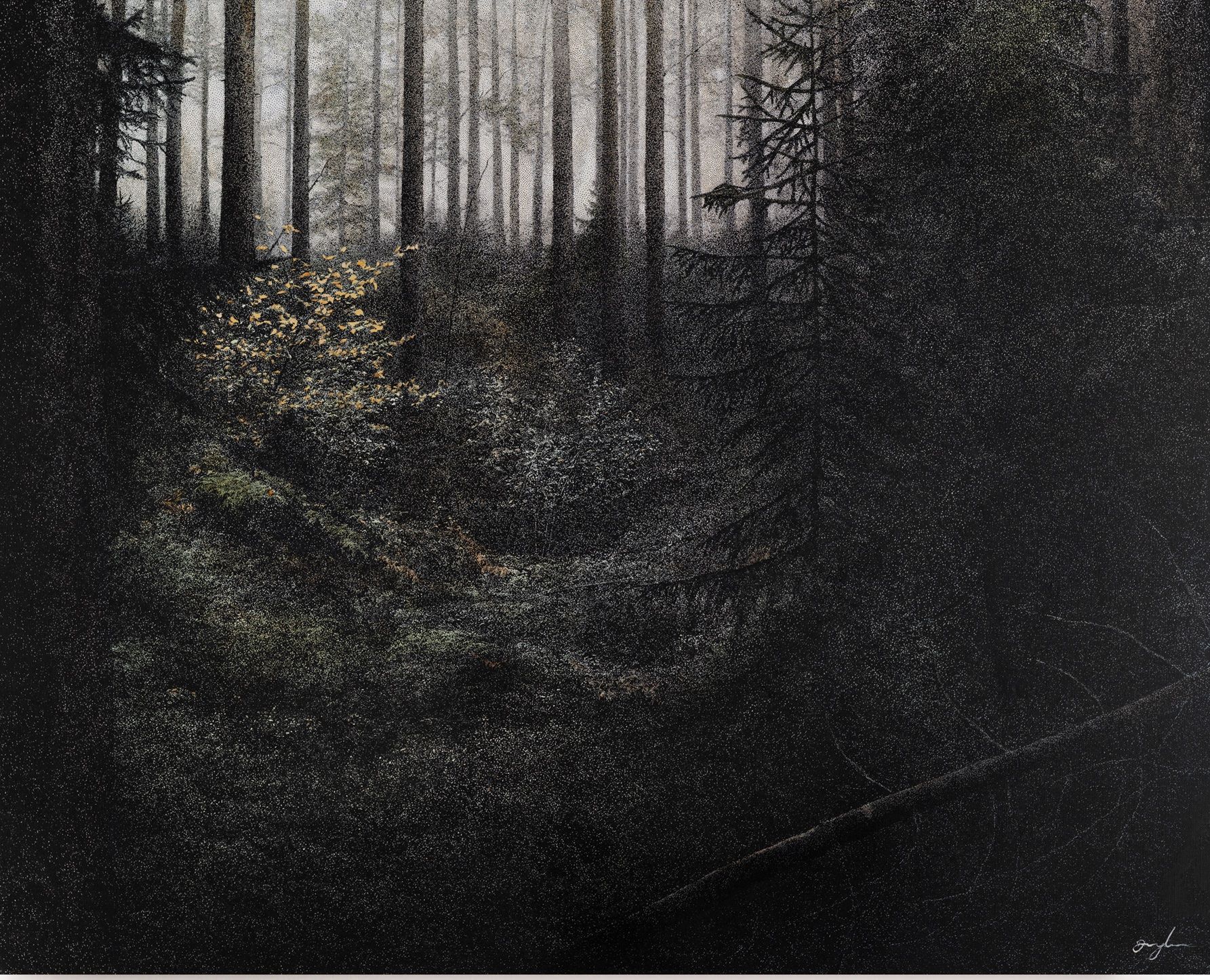
The Norwegian artist Danny Larsen creates evocative near-pitch-black paintings in a style that is so intricately realised as to almost suggest that they might be meditations on the nature of obsessive compulsion. Incorporating stylistic elements of extremely detailed pointilism, and focused primarily on the forest-scapes of his homeland, his work presents an enveloping darkness punctuated by chinks of light that seek to illuminate the sometimes surreal, and seemingly overwhelming beauty he perceives in nature. While firmly based in a realist tradition, these spectral and sometimes other-worldy scenes of his homeland are also redolent of the mythological folklore that is so core to the cultural mores of Scandinavia, conveying a mystical sense of awe at the natural world that owes much to the deference to the natural world that is core to pagan heritage. As such, they are as much about the inner landscape of the painter as they are illustrative of the ghostly enchantment of the forests of the Northern hemisphere. It's perhaps then no surprise then that the artist, now represented by RedHouse Originals Gallery, has spent his whole life deeply embedded in the snow covered landscapes he is so often drawn to explore conceptually, having formerly had a successful career as a professional snowboarder. Here, he tells Culture Collective how the spectre of the forest shaped his psyche as a child, discusses the way in which battles with depression have shaped him as a painter, and explains why he believes art is as fundamental to human existence as water.
The way in which you paint your forest scenes is so incredibly intricate – why such intensive focus on this landscape?
The landscape just got in my bones somehow. I grew up in the countryside just outside of Oslo, right next to what they still call the fairytale forest. It’s just a normal forest, of course, but since it's so dark in Norway, you would often go to school in the morning while it was still pitch dark, and then you would go home from school in the dark too. It looks very mystical as a child, and we would often walk through the forest and imagine seeing wolves and things like that, so it was pretty scary. There were also all of these abandoned cabins we would hang out in, and looking back, I would be terrified, because I was sure they were haunted, but I still had a weird attraction to it all. I didn't really think about it at the time, but I have realised in my adulthood, struggling with bouts of depression, just how much that childhood experience has played in – being within this constant scene of looming mountains and the forest. I mean, I do, and always did love it. And I have always had a strange attraction to the dark stuff – like metal music and strange mythological stuff, but as a child it was, well, a little scary.

It sounds almost as if the forest became an extension of your own childhood imagination …
One hundred percent. That's kind of what I learned later on, because when you become an adult, obviously you can get some distance – manipulate how you see the world, and change your perception. And I try to do that now, flip a little switch in my head to a place where I can actually see the world in a better light. I was tired of living in these kind of shadows, and I realise now that I don't have to, and that I can actually focus on the brighter side of things. My feet will always be planted in those shadows, but I’m peeking over the fence into the light now, and when you do that, you see it's wonderful over there. It's interesting looking back at what I was like when I was a kid, though, and how I saw the world. It’s still too much a part of me for me to get a good overview of what it was like back then, however, because it just felt normal – you wouldn't necessarily have the view as a kid that you were depressed. Even in my 20s, I used to be terrified of coming home after being out snowboarding because I would be in the midst of a weird sadness, but I just thought that was normal. I can't really change it now, so I would rather appreciate it and learn from it – nothing good comes from anything easy in my opinion.

Has your art helped you overcome some of those more depressive tendencies?
I've spent a whole life trying to figure out how I can make it better, and the struggle is always good somehow, because it's always something good that comes out on the other end. Painting is what keeps me sane. The whole idea in my work is that I can choose to see the world beautifully, or I can choose to see the world that comes naturally to me. So, I choose to see the beauty, and I've noticed that if you focus on that, then it becomes much easier to get to those moments where you're, like, holy shit, this is wonderful! I take those moments in life where I really think, oh, this is amazing, and I hold on to that moment in my head and paint it, recreating that moment over and over in my head while I do it. It's like a meditation where I get to focus on the beautiful things in life, and it's cool – truly wonderful. You just have to really be open to the idea that you can see beyond what you just see, you know? That's the reason why I paint so slowly, because I don't want to hurry through anything like that. I mean, if you really can take enough time to just look at a leaf, you can make that a joyous moment.

It sounds like you are trying to capture phenomenological presence?
Yeah. I'm aiming to recreate this feeling. It's not about necessarily what I've seen. I don't really care too much about what it actually is that I'm painting. It's more about how I have chosen to see the world that day. I then want to recreate this moment. It's just a wonderful way to live a life, I think. I've never really thought about other people looking at the work – all I want to do is give the most honest impression of how I choose to see the world, and what it means to me. I believe sharing that is good. Art is always about the things that matter the most to us, and communicating that thing without words. There's something about art that is just so important, and we cannot really pinpoint it - the only way we can pinpoint it is by doing it. We just have that need, and we don’t have to understand why. It sounds really pretentious, but the Dalai Lama said something like all humans need water – some people choose to put some leaves in it, some people like to put bubbles in it, but we all need it. It doesn’t really matter how we find spiritual guidance, or anything else. We are here right now, let’s make the best out of it.
Find out more about Danny Larsen at RedHouse Originals Gallery
Images (top to bottom): When The Light Goes Low; Flowers By The Forest Road; Even I Cannot See The Colours; Between The Shadows. All images courtesy of the artist and RedHouse Originals Gallery.